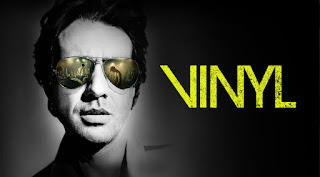Vinyl Review by Daniel Jaramillo
The new HBO TV series “Vinyl” is bringing back the 70s
and giving the audience an insight into the music industry of 1973 with some
flashbacks of the 60s in New York that are part fiction and part reality. This new period drama was created by “Martin
Scorsese” and “Mick Jagger” and is already 6 episodes in with 4 more to run. As
it is a long form television series the show is always finding new ways to show
us what it must have been like to be the head of a record company and competing
to sign artists who are either in their prime or who are just getting started.
The main character is Richie Finestra played by Bobby Cannavale who
is a record executive and runs American Century records. The label is struggling
to keep afloat and their approach to resurrect the label is to sign new artists
or sell the label to new owners. However, everything doesn’t go according to
plan and he finds that he is no longer as powerful as he thought he was to
begin with. He is also having trouble at home with his wife Devon Finestra
played by Olivia Wilde a former actress/model who was part of Andy Warhol’s
Factory. Richie is also being
investigated by the F.B.I as Richie was involved in a murder of a Disc Jokey
who had an argument with him over not playing any music from bands that were
signed to American Century Records.
The other characters are Zak Yankovich played
by Ray Romano who is head of promotions at American Century records, Juno
Temple played by Jamie Vine an assistant and A&R at American Century
Records and Kip Stevens played by James Jagger the son of Mick Jagger who is an
English lead vocalist in a band called the “Nasty Bits” a fictional punk rock
group from New York. Juno and Kip also start a relationship since Juno
discovered the Nasty Bits and lets Richie know about them. Punk in the 70’s was still an unknown genre of music: The Sex Pistols did not even exist back
then. However when they play an audition to Julian Silver played by “Max
Casella” the head of A&R he realizes that they have
no talent playing their instruments and gets them to cover the Kinks songs “You
Really Got Me”.
There are
a few reenactments of real artists from the 70s that make a one of episode
appearance such as Robert Plant from Led Zeppelin, Alice Cooper, Lou Reed of
the Velvet Underground and David Bowie. Richie is also trying to sign a funk
artist but is outcompeted with the other major record labels. Another character
is Lester Grimes played by “Ato Essandoh” who is a soul singer that Richie
signs in the 60’s “which we see as a flashback” but Lester refuses to sign a
contract with American Century and the mob comes to visit him and they break
his wind pipe and loses his singing voice forever. He then quits music but
becomes the manager of the Nasty Bits as he wants them to get the best deal
that works for them when American Century tries to sign them.
The series portrays the
sleaziness of the music industry and how money plays a major role in all of it
underpinnings. Richie is also a cocaine addict sniffing it up in every
opportunity that he can. The 70’s in New York were a thriving time for the
arts, the whole Andy Warhol movement to the rise of Punk and Hip Hop music.
Vinyl however wants to show the audience more of the business side of the music
industry rather than of the creative side. The series overall is very
impressive in it’s aesthetics, showing what the 70’s looked like from the
fashion to the lifestyle and it also does a good job in how people’s attitude’s
were back then. The one flaw it has is referencing dates with regards to
classic albums, the series takes a creative license in placing albums in
certain time periods that are not accurate and it is very apparent to die-hard
music fans of 70’s rock music. The characters are very unlikeable and this what
we have come to except in Scorsese films and now on his television series.
Vinyl will be airing a 2nd series but in my opinion if it is going
to be a success it will need to focus even more on the music than on the antics
and drug habits of record executives.
